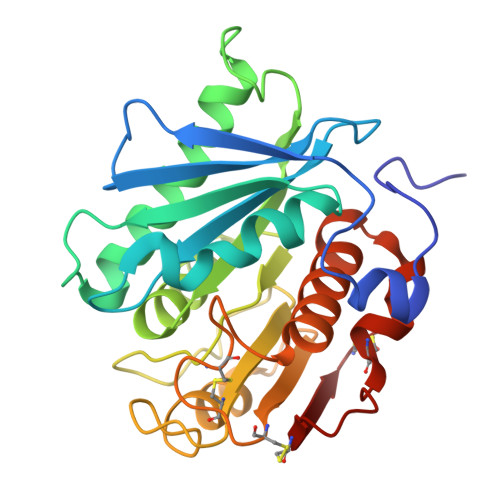Combined approaches to enhance the Pichia pastoris-expressed PET hydrolase.
Li, X., Huang, J.W., Ning, Z., Huang, S., Zeng, C., Zeng, Z., Ji, R., Peng, R., Liu, X., Min, J., Chen, C.C., Guo, R.T.(2025) Int J Biol Macromol : 145862-145862
- PubMed: 40653245
- DOI: https://doi.org/10.1016/j.ijbiomac.2025.145862
- Primary Citation of Related Structures:
9LMS, 9LMT, 9LMU, 9LMV, 9LMW, 9LMX - PubMed Abstract:
Enzymatic degradation of polyethylene terephthalate (PET) provides a sustainable and promising strategy for the recycling of plastic waste. Herein, we employed site-directed mutagenesis and machine learning methods to further enhance the performance of an efficient mutant of IsPETase, FAST-PETase-N212A, and resulting in seven variants with enhanced activity. We also found that the α3-β5 loop containing the T140D mutation plays a significant role in both type I and type II cutinases. Subsequently, we determined the complex structures of two activity-elevated mutants with the PET analogue mono(2-hydroxyethyl)terephthalic acid, revealing a different binding mode. Finally, to facilitate the industrial application of PET hydrolases, we exploited the industrial strain Pichia pastoris to express the activity-enhanced mutants. Compared with E. coli-produced proteins, these mutants expressed by P. pastoris exhibited higher activity and thermal stability.
Organizational Affiliation:
Zhejiang Key Laboratory of Medical Epigenetics, Hubei Hongshan Laboratory, Department of Immunology and Pathogen Biology, School of Basic Medical Sciences, Hangzhou Normal University, 311121 Hangzhou, China; State Key Laboratory of Biocatalysis and Enzyme Engineering, School of Life Sciences, Hubei University, Wuhan 430062, China.
















